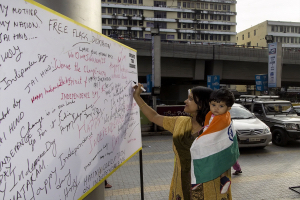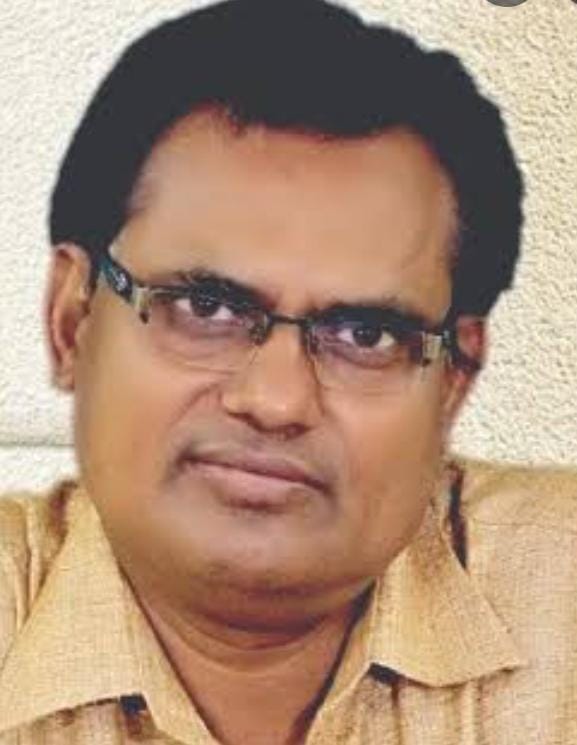
Counterpoint
 By Vivekanand Jha*
By Vivekanand Jha*
‘Victimhood’ of ‘Har Ghar Tiranga‘ should be equated with martyrdom
This Independence Day the celebration of ‘Har Ghar Tiranga‘ had its reverberations and salutary impacts: The nation of 1.30 billion people appeared united in their mission to celebrate the national pride –the tricolour as ‘ one people’ and ‘one nation’– almost unprecedented at least for few decades, if not since independence. The celebration had its own relevance: first, it was the 75th anniversary; second, it coincided with such times when Indian society stood badly divided on religious grounds.
Hence, the spectacular sight of Hindus and Muslims coming together to celebrate the nationalistic spirit purportedly sought to apply the balm on the grievous wound inflicted on them due to religious conflicts and intermittent smouldering of the communal cauldron.
This celebration assumes prima facie importance against the backdrop of the nation’s celebration of democracy which, despite the volatility of times and vicissitude of fortune, carried forward its democratic trajectory with aplomb. The degree of this institutionalised democratic fabric of governance assumes a far greater significance when, the neighbouring countries have had a troubled legacy; where democracy may have taken roots, yet the military dictatorship sought to supplant the democracy in its infancy. For instance, the situation in Pakistan, Bangladesh, and Myanmar –all these countries had a troubled legacy of military rule. The People’s Republic of China, ever since it was born, had seen the institutionalisation of a totalitarian Communist regime. Small wonder then, India alone has the unique distinction of showcasing democracy since independence, barring approximately two years of its suspension during the emergency period.
Whereas the nation was immersed in celebrating the ‘Har Ghar Tiranga‘, it had claimed its unexpected victims –three in Ranchi and one in Bokaro– all these four people were electrocuted during the process of hoisting the flag. Significantly, three members of the same family, unfortunately though, got electrocuted in Ranchi: Vineet Jha(23 years old), his sister Puja Jha( 25 years old) and their cousin Aarti Jha(26 years old). On the 15th of August, at 7.00.p.m. they were trying to straighten the flag, which got tilted; the steel rod got contacted with the live wire leading to the electrocution of all three young people. It was reported that Vineet was the first one to get electrocuted; his sisters too followed suit, when they tried to save their brother. Significantly, the tragedy assumes a humongous proportion when Puja Jha, the sister of Vineet, was already selected for a job in the State Bank of India, and even an appointment letter was given to her, and she was expected to join the bank in next seven days time. The cataclysmic nature of tragedy befalling the family was immeasurable, yet, the blatant insensitivity of the politicians, and government officials becomes all the more tragic. Regrettably, the father of Vineet and Puja had levelled the serious allegation against the electricity department for their callousness and deep negligence of failing to remove the poles which were sufficiently close to his home, which beggars a belief that, on such a historic occasion, the death of young man and women failed to create the shockwave across India as any normal accident supposedly does.
Regrettably, the support coming from the state government was almost negligible; the central government too failed to live up to its expectation: after all, the young man and women died while doing honour to the national flag and, therefore, they should not be treated as ordinary victims, but as martyrs who died doing a service to the nation; while celebrating the nationalistic spirit and, that too, on the prime minister’s exhortation. Hence, their death should be treated as ‘ martyrdom’ for the national cause and not disdainfully dismissed as inconsequential victimhood to be written in an obituary even before the cremation was conducted.
Moreover, the Prime Minister too cannot escape blame if the martyrdom of these young people is not adequately honoured, for if such national tragedy and, that too, for the nationalistic cause, is being deliberately allowed to pass over as a pedestrian affair, will the citizens ever exhibit the spontaneity which they had demonstrated on the historic occasion of 75th anniversary of the nation? The family of Vineet, Puja and Aarti deserve compensation, along with prime ministerial solidarity for such a noble cause which resulted in the death of three young people. It is high time for the nation to take cognizance of this Himalayan tragedy and express collective solidarity with the family of the deceased.
*Author, Academician and a Public Intellectual. The views expressed are personal.





